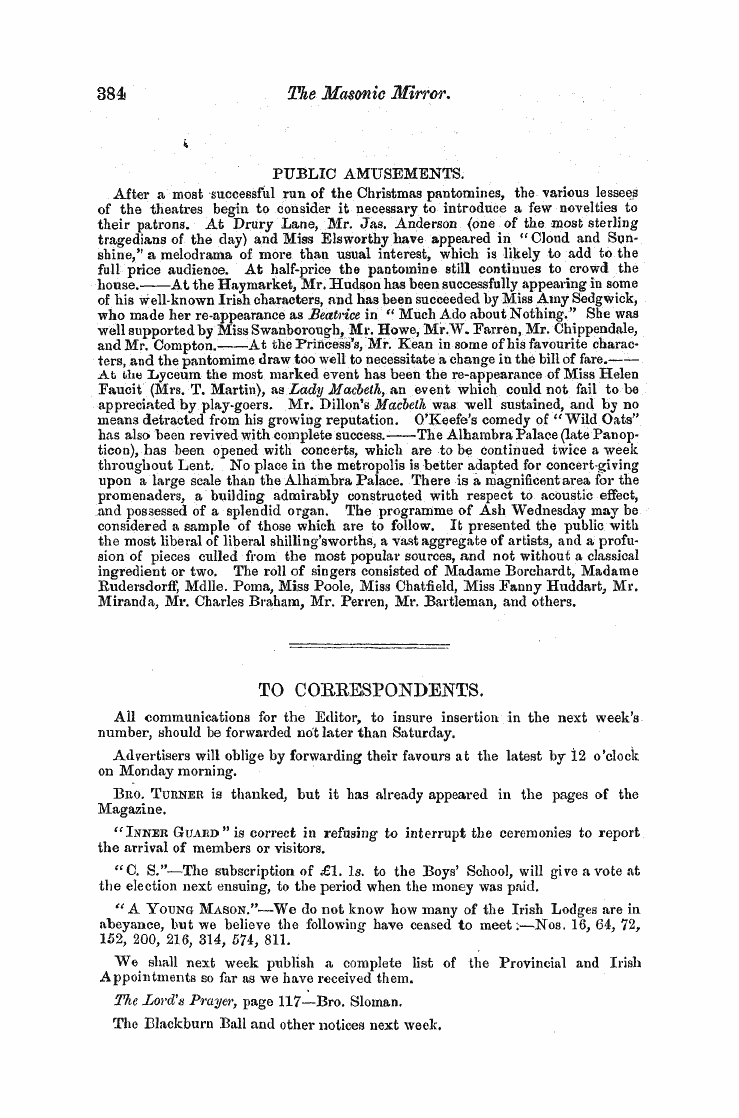-
Articles/Ads
Article CLASSICAL FREEMASONRY, Page 1 of 11 →
Note: This text has been automatically extracted via Optical Character Recognition (OCR) software.
Classical Freemasonry,
CliASSIOAL EEBEMASONRY ,
AS DEVELOPED IN THE POETRY OF THE ANCIENTS . * BY J . I . ADAMS , M . D . Although we have no certain guide to lead us through that labyrinth in which we grope for the discovery of truth , and are so often
entangled in the maze of error , when we attempt to trace the origin of Freemasonry in the manners of remote antiquity ; yet , in what may be considered its classical period , we trust to be able to point out a moral and philosophical resemblance in the principal objects which occur in this research .
Poetry was originally of an earlier date than philosophy . The different species of the former were brought to a certain . ' -pitch of perfection before those of the latter had been cultivated in an equal degree . Imagination shoots forth to its full growth , and even becomes wild and luxuriant , when the reasoning faculty is only beginning to bud , and is wholly unfit to connect the series of
accurate deduction . The information of the senses , from which fancy generally borrows her sublimest images , always obtains the earliest credit , and never fails to make the most lasting impressions . Plato says , that poetry was originally an inspired imitation of those objects which produced either pleasure or admiration . To excite the feelings
and passions , no method could have been so effectual as that of celebrating the perfection of the powers who were supposed to preside over nature . The ode , therefore , in its first formation , was a song in honour of these powers , either sung at solemn festivals , or after the days of Amphion , who was the inventor of the lyre . Thus Horace tells us : —
" Musa dedit fidibus divos , puerosque deorum . "t " The muse to nobler subjects turned her lyre , — Gods , and the sons of gods , her songs inspire . Francis " * In this infancy of the arts , when it was the business of the muse to excite admiration by songs , as the same poet informs us : —
" Publica privatis secernere ; sacra prophanis ; Concubitu prohibere vago ; dare jura maritis , Oppida moliri ; leges incidere liguo , ^ " Poetic wisdom marked with happy mean ,
Public and private , sacred and profane ; The wandering joys of lawless love supprest , With equal rites the . wedded couple blest ; Planned future towns and instituted laws / ' & c . Francis .
* From the American Quarterly Review of Freemasonry . t Hor . de Art . Poet
Note: This text has been automatically extracted via Optical Character Recognition (OCR) software.
Classical Freemasonry,
CliASSIOAL EEBEMASONRY ,
AS DEVELOPED IN THE POETRY OF THE ANCIENTS . * BY J . I . ADAMS , M . D . Although we have no certain guide to lead us through that labyrinth in which we grope for the discovery of truth , and are so often
entangled in the maze of error , when we attempt to trace the origin of Freemasonry in the manners of remote antiquity ; yet , in what may be considered its classical period , we trust to be able to point out a moral and philosophical resemblance in the principal objects which occur in this research .
Poetry was originally of an earlier date than philosophy . The different species of the former were brought to a certain . ' -pitch of perfection before those of the latter had been cultivated in an equal degree . Imagination shoots forth to its full growth , and even becomes wild and luxuriant , when the reasoning faculty is only beginning to bud , and is wholly unfit to connect the series of
accurate deduction . The information of the senses , from which fancy generally borrows her sublimest images , always obtains the earliest credit , and never fails to make the most lasting impressions . Plato says , that poetry was originally an inspired imitation of those objects which produced either pleasure or admiration . To excite the feelings
and passions , no method could have been so effectual as that of celebrating the perfection of the powers who were supposed to preside over nature . The ode , therefore , in its first formation , was a song in honour of these powers , either sung at solemn festivals , or after the days of Amphion , who was the inventor of the lyre . Thus Horace tells us : —
" Musa dedit fidibus divos , puerosque deorum . "t " The muse to nobler subjects turned her lyre , — Gods , and the sons of gods , her songs inspire . Francis " * In this infancy of the arts , when it was the business of the muse to excite admiration by songs , as the same poet informs us : —
" Publica privatis secernere ; sacra prophanis ; Concubitu prohibere vago ; dare jura maritis , Oppida moliri ; leges incidere liguo , ^ " Poetic wisdom marked with happy mean ,
Public and private , sacred and profane ; The wandering joys of lawless love supprest , With equal rites the . wedded couple blest ; Planned future towns and instituted laws / ' & c . Francis .
* From the American Quarterly Review of Freemasonry . t Hor . de Art . Poet































































































































































































